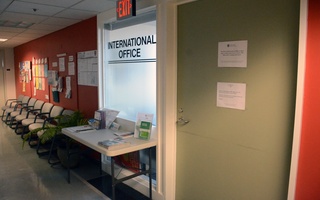For Harvard's international students, remaining in the United States after graduation can be complicated.
But for students in science, technology, engineering, and math, the process just became less stressful, because the federal government decided last month they can stay in the country for an additional seven months of on-the-job training.
International students enter Harvard with a student visa, known as the F-1 visa. Students can then apply for Optional Practical Training, which allows for one year of on-the-job training in an area related to their degrees.
Under the old program, students in STEM fields had an additional 29-month extension. Now, they can stay for 36 months as they push for the main object of desire a couple rungs below the coveted green card: the H-1B work visa.
Rohan Mazumdar, a master’s student from India studying statistics, said the process is “pretty unnerving.”
“Planning for the future is something that becomes very tricky with all of these things kind of in the air,” he said.
While there is no cap on student visas, there is a cap on the H-1B. Sixty-five thousand undergraduate applicants and 20,000 students pursuing advanced degrees are selected annually. Last year, U.S. Citizenship and Immigration Services received 233,000 H-1B applications. The agency then used a computer-generated random lottery to decide which applications get considered.
Mazumdar said he was fortunate enough to get an H-1B on his first try. But he added that the acceptance rate was a bit more promising several years ago when he applied.
For international students trying to beat the odds, Mazumdar said their best bet is to pursue an advanced degree in a STEM field. This grants the extra three year extension, allowing for an extra shot at the H-1B.
“It definitely impacts life choices, you know, choice of major, choice of career and industry,” Mazumdar said, adding that visa concerns probably amounted to “30 or 40 percent” of the reason why he is studying statistics rather than pursuing an MBA.
Aleksandra Kudryashova, a Ph.D. student from Russia in the German Department, spoke of the divide between STEM and humanities she felt at an event geared toward filing taxes.
“Half of them were from STEM and they were very happy that something had improved. But the other half were from humanities and they were really depressed that they still have only one year,” Kudryashova said.
But even with a STEM degree, sometimes it all comes down to luck, Ph.D. student Chinmay Shukla said. Shukla, an international student from India pursuing a degree in biological and biomedical sciences, said his friend at Carnegie Mellon, who had a STEM degree, did not get an H-1B and had to leave the country.
“The luck of the draw did not work in her favor,” Shukla said.
Mazumdar said he also has peers who had to return to their home countries. He added that some simply have to reconstruct their lives, while others apply to master’s programs as a backup plan to ensure that they at least can stay with a student visa.
Shukla said that more and more international students are looking to places like Canada and Europe for opportunities.
“I want to move to Canada because I feel like the country does not want me here,” Shukla said. “If someone doesn’t want you at a certain place, then you don’t stay there.”
According to Graduate School of Arts and Sciences spokesperson Ann Hall, international students can use the Harvard International Office, which works closely with the Graduate School of Arts and Sciences, as a resource. There are 1,427 international students in GSAS, hailing from 87 countries, according to the HIO.
Aside from University offices, international students are now also turning to the Harvard Graduate Students Union-United Auto Workers. The HGSU-UAW hosted several visa seminars in March, featuring an immigration lawyer.
Kudryashova, a supporter of the union effort, attended a seminar and said it was “very helpful.” She added that as a third-year student, it is important to know about the immigration system ahead of time.
“We’re sort of thinking everything’s golden and we’re fine, and not really realizing how much stress it will be to actually apply for it, to wait for the lottery, and then maybe not get it,” Kudryashova said.
—Staff writer Leah S. Yared can be reached at leah.yared@thecrimson.com. Follow her on Twitter @Leah_YaredRead more in University News
Harvard Medical School Passes 70 Percent of Capital Campaign GoalRecommended Articles
-
Visa Applicants Deserve BetterThe United States’ visa policy for foreign students is appallingly muddled—leaving many students who dream of attending higher eduction in
-
 Harvard Affiliates Protest Revised Immigration Ban
Harvard Affiliates Protest Revised Immigration Ban -
 Fast-Track Visa Suspension Could Jeopardize Hiring
Fast-Track Visa Suspension Could Jeopardize Hiring -
 Passport to Uncertainty
Passport to Uncertainty -
 Harvard Signs Amicus Brief Opposing More Stringent Student Visa Policies
Harvard Signs Amicus Brief Opposing More Stringent Student Visa Policies













